Best Essential Oils for Sleep and How to Incorporate Them Into Your Sleep Routine
If you’ve ever gotten a relaxing or restorative massage, the masseuse likely used essential oils not just so their hands moved easily over your skin, but because certain fragrances promote relaxation, calm, and stress relief. Essential oils have been used for centuries as a form of aromatherapy.
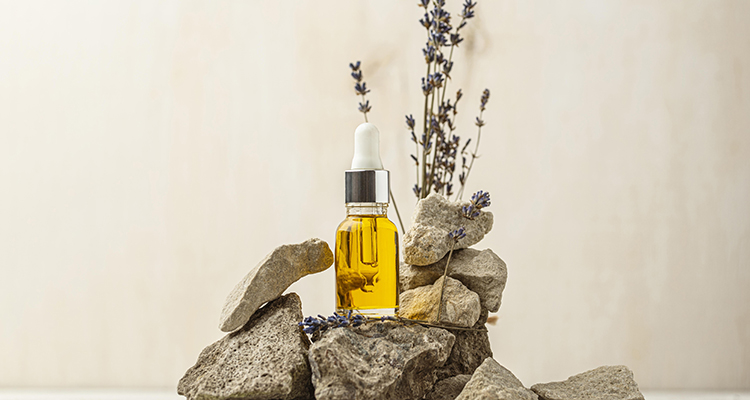
In their basic form, essential oils are oils extracted from certain plants that are extremely fragrant and used to ease anxiety, treat infections, and help you sleep. But can the mere act of smelling a pretty scent really wash all your worries away so you can achieve deep, quality sleep?
Yes and no. In this article, we’ll briefly discuss how essential oils work and focus mainly on the best essential oils for sleep and how to incorporate them into your daily and nightly routine.
Content
The Connection Between Essential Oils and Sleep
Before we share the best essential oils for sleep, let’s briefly discuss how these plant extracts work to reduce stress and improve sleep quality, among other benefits. Essential oils are plant oils that are extracted and highly concentrated. Not only can certain essential oils help you sleep better but many are credited with relieving migraines, toothaches, and even depression.
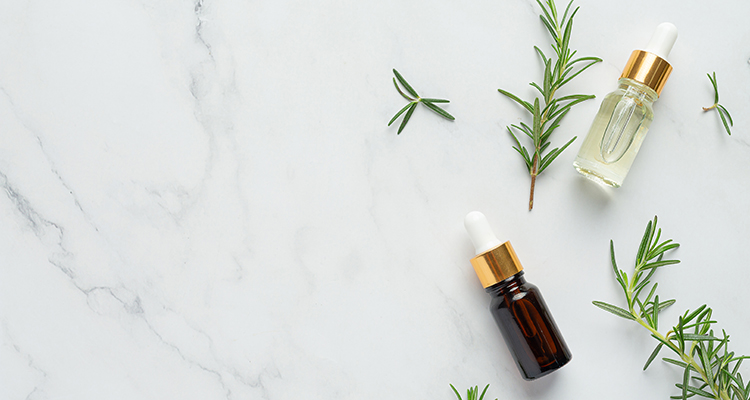
Studies suggest that certain essential oils activate and interact with the body’s parasympathetic nervous system. This nervous system is a network of nerves that work together to relax your body during and after periods of stress, anxiety, or in response to danger. The parasympathetic nervous system also controls certain life-sustaining processes in the body including digestion, but only when your body is in a state of relaxation and you feel safe. By interacting with this system, essential oils can help calm your nerves, reduce stress, and make it easier to fall and stay asleep.
A study conducted in 2020 of 105 cardiac patients with sleep disorders found that those who inhaled lavender oil and peppermint oil before bed experienced better quality sleep than those participants who inhaled scented distilled water.
The Best Essential Oils for Sleep
Different essential oils and fragrances serve different purposes and each offer its own unique benefits. If you’re looking to improve your sleep quality, ease insomnia symptoms, and say goodbye to restless sleep, these essential oils may help.
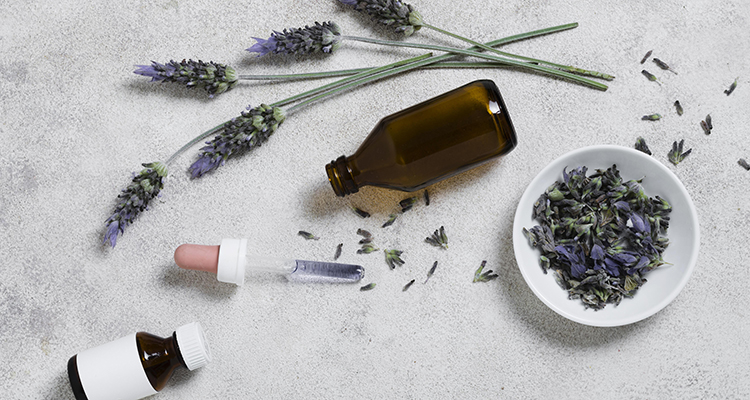
Lavender Oil
Lavender has long been praised for its calming properties and ability to relieve stress and anxiety. It’s also one of the most popular and effective essential oils for sleep. Derived from the lavender flower, this floral fragrance offers a plethora of unique benefits that, in turn, improve sleep. For example, reduced heart rate, internal body temperature, and lowered blood pressure – all of which mirror the processes your body goes through before drifting off to sleep. Studies also indicate that lavender can reduce stress and anxiety, two of the leading causes of insomnia. Lavender also contains two important chemical compounds – linalyn and linalool – which work to calm the body’s central nervous system.
By helping relax your mind and body at the end of a long day, people find it easier to fall asleep and report waking less frequently during the night. Lavender oil may also ward off daytime drowsiness or fatigue the next morning. Place a few drops of lavender oil on your pillow before bed or add it to a warm soothing bath. You can also use an essential oil diffuser and fill your bedroom with a calming floral aroma.
Chamomile Oil
Popular as an herbal tea, the oil extracted from the chamomile flower is said to have sedative properties. This is why it’s praised as one of the best essential oils for sleep. There are two types of chamomile, both with their own unique benefits. Roman chamomile has a fresh, apple aroma and is credited with promoting relaxation and reducing anxiety. German chamomile, on the other hand, may offer pain-relieving benefits for those left tossing and turn at night in discomfort. Add chamomile oil to your bedroom diffuser or directly on your sheets. You can also sip a hot cup of chamomile tea before bed. Just know that chamomile oil for aromatherapy is different from the chamomile you ingest in flavored teas.
Ylang-Ylang Oil
Not quite as popular as lavender or chamomile, ylang-ylang oil is still one of the most effective at easing insomnia symptoms and promoting a good night’s sleep. This oil is extracted from a specific tropical tree found in Asia. Like lavender oil, ylang-ylang works to reduce your blood pressure and heart rate, helping you naturally enter a state of relaxation and, eventually, sleep. Unlike chamomile and lavender oils which have a floral aroma, ylang-ylang smells fruity with hints of honey.
Peppermint Oil
Although peppermint oil isn’t quite a sleep aid, it is one of the best essential oils for helping clear out your head – both figuratively and literally. Peppermint promotes restfulness by helping induce relaxation and ease symptoms associated with dust and other seasonal allergies. If congestion or a headache is keeping you up at night, peppermint oil can ease these symptoms, making it easier for you to achieve a quality night’s sleep. Try adding a few drops of peppermint oil to a diffuser and fill your room with a fresh, minty scent. As your nasal passages clear, so will your mind and you’ll soon find yourself drifting off to sleep.
Bergamot Oil

Bergamot oil is one of the most versatile essential oils for sleep, offering a variety of benefits depending on your situation. For example, this oil is well-known for its anti-inflammatory properties, helping ease chronic pain which makes it difficult to find a comfortable sleep position and may even wake you up during the night. Bergamot also has antibacterial properties which help strengthen your immune system. Similar to other essential oils on this list, bergamot oil reduces your heart rate and blood pressure, putting you in the ideal physical and mental state for sleep. In addition, certain studies show that bergamot oil may help reduce stressful or anxious thoughts which are a common barrier to quality sleep. Bergamot oil is often mixed with other beneficial oils for sleep including ylang-ylang, lavender, and sandalwood.
A popular way to inhale this aroma is by placing a few droplets in a pot of steaming water, placing a towel over your head, and letting the refreshing sweet aroma fill your nose and wash your stress away. Bergamot is sometimes extracted and sold as a juice that people can ingest before bed.
Sandalwood Oil
Speaking of sandalwood oil, that’s the next essential oil for sleep on our list. A few things that stand out about this essential oil are that the aroma is extremely rich and it also comes with a pretty hefty price tag. But, in life, you get what you pay for. Sandalwood oil is one of the most effective at promoting deep, restorative sleep thanks to its mood-regulating properties. Sandalwood is one of the only essential oils that work to balance your emotions so you can peacefully drift off to sleep.
But the benefits don’t end there. Sandalwood oil also works to lower your heart rate and breathing, putting you in a more relaxed physical state. To experience the most benefits of this essential oil, try mixing it with other oils on this list before placing a few drops into an aroma diffuser.
Cedarwood Oil
Most of the best essential oils for sleep have either a fruity or floral aroma, but cedarwood oil is different. As the name suggests, this essential oil has more of a woodsy aroma similar to sandalwood but is more affordable. People claim that cedarwood oil can help “take the edge off” after a long or stressful day. Cedarwood oil can be combined with chamomile, lavender, or ylang-ylang and added to an essential oil diffuser or used topically.
Cedarwood oil also contains the chemical compound cedrol which is said to have sedative properties. Inhaling any essential oil that contains cedrol may improve sleep quality in children, healthy adults, and elderly individuals with dementia. Similar to other essential oils for sleep, cedarwood activates the body’s parasympathetic nervous system. Studies show that it may take up to 3 weeks for you to notice the benefits of cedarwood oil and improvements in your overall sleep quality. Other benefits include a reduction in early morning awakenings and an increase in total sleep time.
Marjoram Oil
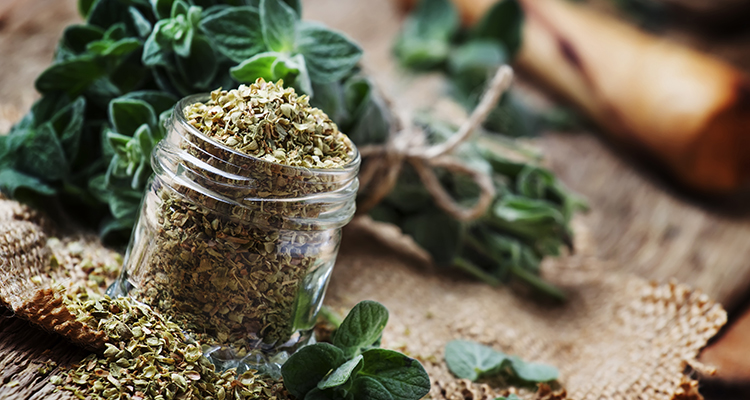
Not only does marjoram oil help you fall asleep faster but it’s one of the best essential hours for reducing nighttime awakenings. This sweet fragrance offers both physical and mental benefits and is said to promote deep, peaceful sleep. In this state of deep relaxation, your body can truly recharge and heal itself. The scent of marjoram oil combines all of the above-mentioned aromas including a sweet floral smell with woodsy undertones. Studies show that when you’re choosing a marjoram oil or product for sleep, the sweeter it is, the better.
Clary Sage Oil
This herb originates from southern Europe and is derived from the same plant used to produce dried sage but offers different benefits. Clary sage oil is one of the best essential oils for sleep and for treating various depressive disorders. Depression sufferers swear by the oil’s ability to rid their minds of dark and anxious thoughts. By soothing and reducing these racing thoughts, clary sage oil can help you overcome the mental obstacles keeping you from deep, restorative sleep.
Clary sage is also said to reduce levels of the stress hormone cortisol in the body. Cortisol also impacts the body’s sleep-wake cycle and may be associated with alertness. By lowering cortisol levels, you may feel more tired and prepared for sleep at night. In the process, you may notice a reduction in your heart rate and blood pressure.
Eucalyptus Oil
Most people associated eucalyptus with adorable koala bears. But the oil extracted from this plant serves many other purposes, including improving sleep quality. Similar to peppermint oil, the aroma of the eucalyptus leaf is naturally potent and relaxing. It also helps clear nasal and sinus congestion. Many people with excess congestion or phlegm production report feeling intense relief after inhaling eucalyptus oil. By clearing your nasal passages, you can breathe and sleep better.
Vetiver Oil
Vetiver oil has an instantly recognizable aroma which is described as warm, dry, and earthy. Because of the oil’s intense smell, it isn’t for everyone. Some people find vetiver oil a bit too overpowering, but if you can warm up to this scent you can enjoy its notable benefits. Vetiver oil works to help calm the mind as you purge your stress and anxious thoughts from the day. The best way to experience vetiver oil is by using an essential oil diffuser. Place it near your bedside and turn it on as you lay down to help your worries melt away.
Valerian Oil
Valerian is a popular ingredient in many OTC sleep aids and supplements, so it should come as no surprise that valerian oil offers unique benefits that promote quality sleep. Valerian oil smells earthy and woodsy like others on the list but it doesn’t just help you fall asleep – it helps you enter a deep state of relaxation and sleep unmatched by many other essential oils. Research suggests that valerian oil and the root it comes from increased levels of GABA (gamma aminobutyric acid) in the brain, which are associated with relaxation and calm. By increasing GABA levels, valerian oil can offer substantial stress relief when you need it most.
Incorporating Essential Oils Into Your Sleep Routine
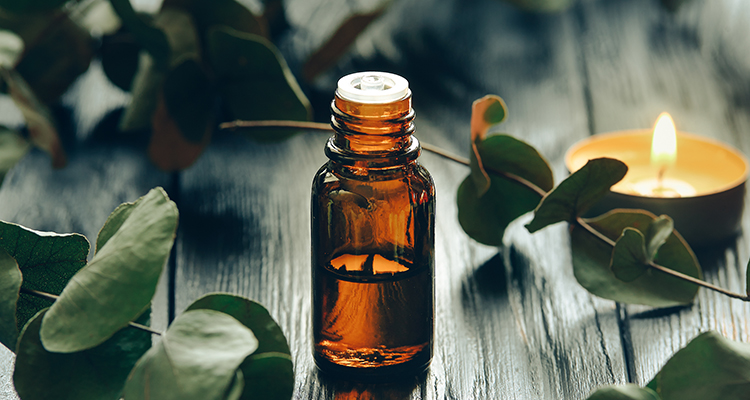
The best way to enjoy the benefits of these essential oils for sleep is to add them to your nightly routine. Whether you invest in an essential oil diffuser to fill your room with these fragrances or place a few droplets on your sheets and pillow, make these oils a staple in your sleep routine. Not only will their underlying properties provide relief and improve your sleep quality, but the mere act of performing the same routine behaviors each night is said to help combat insomnia. That’s because your body views these habits as triggers for sleep. Follow your sleep schedule at the same time each night and before long, your body will subconsciously become tired and start to wind down and prepare for sleep naturally.
How to Use the Best Essential Oils for Sleep
Most essential oils are inhaled using either an aroma diffuser or directly from the bottle. Some users rub a few droplets of oil on their skin or place a few on their pillows or in a warm bath. You can also carry a small bottle with you to smell throughout the day, as needed.
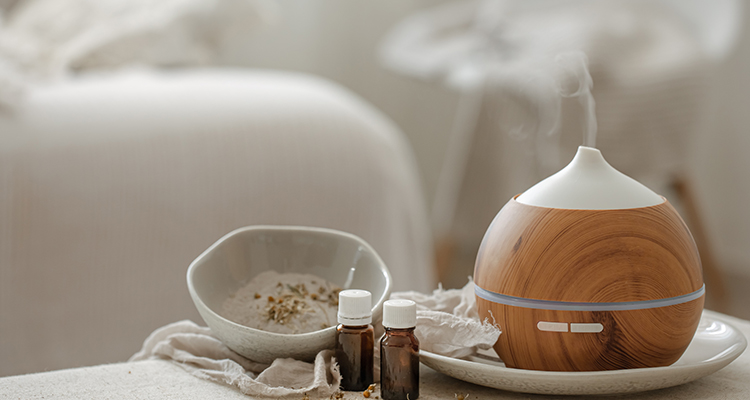
To avoid skin irritation, always mix essential oils for sleep with vegetable oil before placing them on your skin, sheets, or in your bath water. Once diluted, you can also massage these oils directly into your skin as a topical treatment. Before you do, though, make sure you don’t have any allergies to plant chemicals. Once absorbed into the skin, some essential oils can cause inflammation, dermatitis, and other unpleasant side effects. Also keep in mind that on their own, essential oils are extremely potent. A few drops go a long way.
Improve Sleep Quality in the Natural Way

If you’re looking for a natural, gentle way to improve your sleep and ease insomnia symptoms, these essential oils for sleep may help. Let these relaxing scents fill your bedroom, bathtub, and nose to help reduce stress and promote relaxation. You can also incorporate these oils into your nightly routine. Looking for more recommendations for improving sleep and making positive lifestyle changes that will benefit your overall well-being? Click here!













